
William James "Count" Basie was an African-American jazz pianist, organist, bandleader, and composer. In 1935, he formed the Count Basie Orchestra, and in 1936 took them to Chicago for a long engagement and their first recording. He led the group for almost 50 years, creating innovations like the use of two "split" tenor saxophones, emphasizing the rhythm section, riffing with a big band, using arrangers to broaden their sound, and others. Many musicians came to prominence under his direction, including the tenor saxophonists Lester Young and Herschel Evans, the guitarist Freddie Green, trumpeters Buck Clayton and Harry "Sweets" Edison, plunger trombonist Al Grey, and singers Jimmy Rushing, Helen Humes, Thelma Carpenter, and Joe Williams.
Swing music is a style of jazz that developed in the United States during the late 1920s and early 1930s. It became nationally popular from the mid-1930s. The name derived from its emphasis on the off-beat, or nominally weaker beat. Swing bands usually featured soloists who would improvise on the melody over the arrangement. The danceable swing style of big bands and bandleaders such as Benny Goodman was the dominant form of American popular music from 1935 to 1946, known as the swing era. The verb "to swing" is also used as a term of praise for playing that has a strong groove or drive. Musicians of the swing era include Duke Ellington, Benny Goodman, Count Basie, Cab Calloway, Jimmy Dorsey, Tommy Dorsey, Woody Herman, Harry James, Lionel Hampton, Glenn Miller, Artie Shaw and Django Reinhardt.

James Andrew Rushing was an American singer and pianist from Oklahoma City, Oklahoma, U.S., best known as the featured vocalist of Count Basie's Orchestra from 1935 to 1948.
Charles Phillip Thompson was an American swing and bebop pianist, organist, composer, and arranger.

Benjamin Moten was an American jazz pianist and band leader born and raised in Kansas City, Missouri, United States.
Walter Sylvester Page was an American jazz multi-instrumentalist and bandleader, best known for his groundbreaking work as a double bass player with Walter Page's Blue Devils and the Count Basie Orchestra.
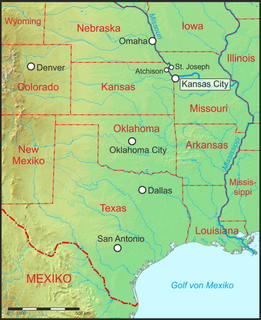
Kansas City jazz is a style of jazz that developed in Kansas City, Missouri during the 1920s and 1930s, which marked the transition from the structured big band style to the much more improvisational style of bebop. The hard-swinging, bluesy transition style is bracketed by Count Basie, who in 1929 signed with the Bennie Moten's Kansas City Orchestra, and Kansas City native Charlie Parker, who ushered in the bebop style in America. It has been said that while New Orleans was the birthplace of jazz, "America's music" grew up in Kansas City.
"Kansas City Shuffle" is the name of a 1926 jazz song.

Herschel "Tex" Evans was an American tenor saxophonist who was a member of the Count Basie Orchestra. He also worked with Lionel Hampton and Buck Clayton. He is also known for starting his cousin Joe McQueen's interest in the saxophone. Joe McQueen, living until 2019 at age 100, may well have been the last surviving person to have known Herschel during his lifetime.
Tommy Douglas was an American jazz clarinetist, bandleader, and reed instrumentalist.
Edward Durham was an American jazz guitarist, trombonist, composer, and arranger. He was one of the pioneers of the electric guitar in jazz. The orchestras of Bennie Moten, Jimmie Lunceford, Count Basie, and Glenn Miller took great benefit from his composing and arranging skill.
Orchestral jazz is a form of jazz that developed in New York City in the 1920s. Early innovators of the genre, such as Fletcher Henderson and Duke Ellington, include some of the most highly regarded musicians, composers, and arrangers in all of jazz history. The fusion of jazz's rhythmic and instrumental characteristics with the scale and structure of an orchestra, made orchestral jazz distinct from the musical genres that preceded its emergence. Its development contributed both to the popularization of jazz, as well as the critical legitimization of jazz as an art form.
"New Orleans" is a 1932 popular song written by Hoagy Carmichael. The song is now considered a jazz standard, along with several other Carmichael compositions such as "Stardust", "Georgia on My Mind" and "Lazy River".
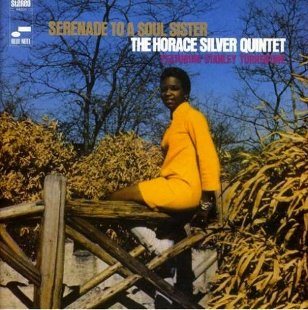
Serenade to a Soul Sister is an album by jazz pianist Horace Silver released on the Blue Note label in 1968, featuring performances by Silver with Charles Tolliver, Stanley Turrentine, Bennie Maupin, Bob Cranshaw, John Williams, Mickey Roker and Billy Cobham.
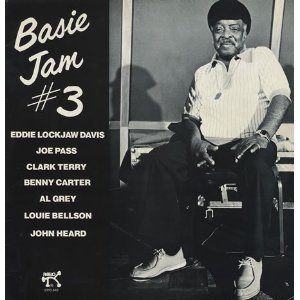
Basie Jam 3 is a 1976 studio album by Count Basie, produced at the same sessions as Basie Jam 2.
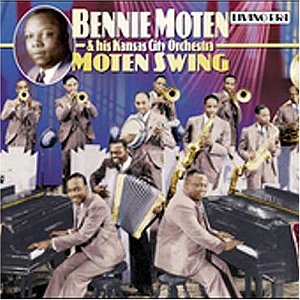
"Moten Swing" is a 1932 jazz standard by Bennie Moten and his Kansas City Orchestra. It was an important jazz standard in the move towards a freer form of orchestral jazz and the development of Swing music. Moten and his Orchestra, which included Count Basie on piano, achieved much success with it, although the song is most associated with Basie's Count Basie Orchestra, who recorded it in 1940.
Thamon Hayes was a Dixieland jazz trombonist and composer of the early Kansas City jazz scene, who along with Bennie Moten composed several of the hits of the Bennie Moten's Kansas City Orchestra such as "South" and the original 1927 version of "Moten Swing". He left the band in 1931 to form the Kansas City Rockets, which in 1936 became "Leonard's Rockets". Hayes´ new band were billed by the Kansas City Call as "the new wonder band of accomplished musicians", and their first performance was met with unprecedented attention in Kansas City driving the crowds wild.
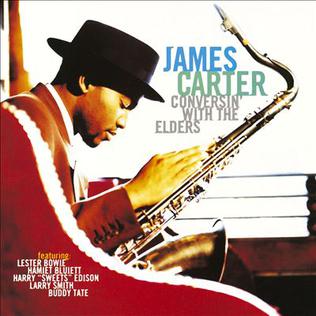
Conversin' with the Elders is the fourth album by saxophonist James Carter recorded in late 1995 and early 1996 and released on the Atlantic label. The album features guest appearances by Lester Bowie, Larry Smith, Harry "Sweets" Edison, Hamiet Bluiett and Buddy Tate.
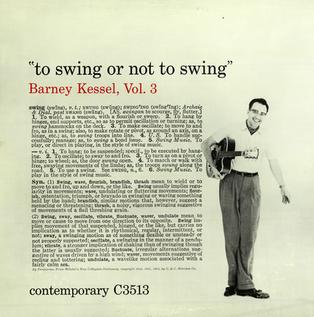
To Swing or Not to Swing is an album by guitarist Barney Kessel released on the Contemporary label which was recorded at sessions in 1955.

Breakfast Dance and Barbecue is a live album by pianist, composer and bandleader Count Basie and his Orchestra with vocalist Joe Williams featuring tracks recorded at a Disc Jockey convention in Florida in 1959 and originally released on the Roulette label.










